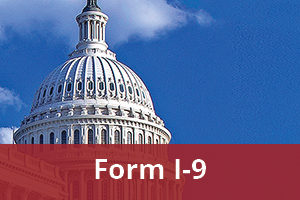by CUPA-HR | August 9, 2023
On August 3, 2023, the Department of Homeland Security (DHS) published a notice in the Federal Register seeking comments on a potential pilot program to allow employers not enrolled in E-Verify to harness remote examination procedures for the Form I-9, Employment Eligibility Verification.
Background
DHS’s recent actions are built upon a series of moves aimed at modernizing and making more flexible the employment verification process. On July 25, 2023, the DHS rolled out a final rule enabling the Secretary of Homeland Security to authorize optional alternative examination practices for employers when inspecting an individual’s identity and employment authorization documents, as mandated by the Form I-9. The rule creates a framework under which DHS may implement permanent flexibilities under specified conditions, start pilot procedures with respect to the examination of documents, or react to crises similar to the COVID-19 pandemic.
Alongside the final rule, DHS published a notice in the Federal Register authorizing a remote document examination procedure for employers who are participants in good standing in E-Verify and announced it would be disclosing details in the near future about a pilot program to a broader category of businesses.
Key Highlights of the Proposed Non-E-Verify Remote Document Examination Pilot
DHS’s proposal primarily revolves around the following points:
- Purpose: Immigration and Customs Enforcement (ICE) intends to gauge the security impact of remote verification compared to traditional in-person examination of the Form I99. This involves evaluating potential consequences like error rates, fraud and discriminatory practices.
- Pilot Procedure: The new pilot program would mirror the already authorized alternative method for E-Verify employers, including aspects such as remote document inspection, document retention and anti-discrimination measures.
- Eligibility: The pilot program is open to most employers unless they have more than 500 employees. However, E-Verify employers are excluded since DHS has already greenlit an alternative for them.
- Application Process: Interested employers must fill out the draft application form, which DHS has made available online. This form captures details like company information, terms of participation, participant obligations, and more.
- Information Collection: Employers wishing to join the pilot would be required to complete the formal application linked above. ICE would periodically seek data from these employers, such as the number of new hires or how many employees asked for a physical inspection.
- Documentation: Participating companies must electronically store clear copies of all supporting documents provided by individuals for the Form I-9. They might also be required to undertake mandatory trainings for detecting fraudulent documents and preventing discrimination.
- Onsite/Hybrid Employees: Companies might face restrictions or a set timeframe for onsite or hybrid employees, dictating when they must physically check the Form I-9 after the initial remote assessment.
- Audits and Investigations: All employers, including pilot participants, are liable for audits and evaluations. DHS plans to contrast data from these assessments to discern any systemic differences between the new method and the traditional one.
What’s Next: Seeking Public Comments by October 2
DHS is actively seeking feedback from the public regarding the proposed pilot and the draft application form. The department encourages stakeholders to consider and provide insights on the following points:
- Practical Utility: Assess if the proposed information requirement is vital for the agency’s proper functioning and whether the data collected will be practically useful.
- Accuracy and Validity: Analyze the agency’s estimation of the information collection’s burden, ensuring the methods and assumptions are valid.
- Enhance Information Quality: Offer suggestions to improve the clarity, utility and overall quality of the data collected.
- Minimize Collection Burden: Propose ways to ease the data collection process for respondents, exploring technological solutions such as electronic submissions.
In light of this, CUPA-HR plans to carefully evaluate the notice and associated application. Based on its review, CUPA-HR is considering submitting comments to provide valuable insights to DHS. CUPA-HR will keep members apprised of any updates regarding this proposed pilot program and other changes to Form I-9 alternative examination procedures.


